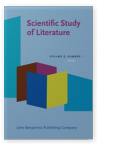The literary genre effect
A one-word science fiction (vs. realism) manipulation reveals intrinsic
text properties outweigh extrinsic expectations of literary quality
We test the literariness of genre fiction with an empirical
study that directly manipulates both intrinsic text properties and extrinsic
reader expectations of literary merit for science-fiction and narrative-realism
stories. Participants were told they were going to read a story of either low or
high literary merit and then read one of two stories that were identical except
for one genre-determining word. There were no differences between the
science-fiction and narrative-realism versions of the story in literary merit
perception, text comprehension, or inference effort for theory of mind and plot.
Participants did, however, exert more theory-of-world effort (i.e.,
world-building) for the science-fiction version. The more inference effort
science-fiction readers dedicated to theory of world, the more cognitively and
emotionally engaged they were. These results contradict the assumption that
science fiction cannot achieve literariness and instead demonstrate a “literary
genre effect.”
Article outline
- Current study
- Method
- Participants
- Source and text manipulation
- Questionnaires
- Procedure
- Results
- Inference effort
- Transportation
- Literary quality perception
- Comprehension
- Differential relationship between inference effort and
transportation
- General discussion
- Conclusion
-
References
References
Alexandrov, V. E.
(
2007)
Literature, literariness, and the brain.
Comparative Literature, 59(2), 97–118.


Appel, M., Gnambs, T., Richter, T. & Green, M.
(
2015)
The transportation scale–short form (TS–SF),
Media Psychology, 18(2), 243–266.


Barnes, J.
(
2018)
Imaginary engagement, real-world effects: Fiction, emotion, and
social cognition.
Review of General Psychology, 22(2), 125–134.


Benthian, C.
(
2012)
The Literariness of new media art – a case for expanding the
domain of literary studies.
Journal of Literary Theory, 61, 311–336.


Carney, J., Wlodarski, R. & Dunbar, R.
(
2014)
Inference or enaction? The impact of genre on the narrative
processing of other minds.
PLoS ONE, 9(12): e114172.


Chung-Fat-Yim, A., Peterson, J. & Mar, R.
(
2017)
Validating self-paced sentence-by-sentence reading: Story
comprehension, recall, and narrative transportation.
Read Writ, 301, 857–869.


Dodell-Feder, D., & Tamir, D. I.
(
2018)
Fiction reading has a small positive impact on social cognition:
A meta-analysis.
Journal of Experimental Psychology: General. Advance online publication.


Dixon, P., & Bortolussi, M.
Djikic, M., Oatley, K., & Moldoveanu, M. C.
Duchamp, L.
(
2015)
A few thoughts about critics, legitimacy, and
comfort.
The Cascadia Subduction Zone, 5(2), 1–7.

Emmott, C., Sanford, A. J., & Dawydiak, E. J.
(
2007)
Stylistics meet cognitive science: Studying style in fiction and
readers’ attention from an interdisciplinary perspective.
Style, 411, 204–224.

Fong, K., Mullin, J., & Mar, R.
(
2013)
What you read matters: the role of fiction genre in predicting interpersonal sensitivity.
Psychology of Aesthetics, Creativity, and the Arts, 7(4), 370–376.


Gavaler, C., & Johnson, D.
Gavaler, C.
(
2017)
Science fiction makes you stupid, Comments,
The Patron Saint of Superheroes,
[URL]
Hanauer, D.
(
1998)
Reading poetry: An empirical investigation of formalist,
stylistic, and conventionalist claims.
Poetics Today, 191, 565–580.


Kidd, D. C., & Castano, E.
(
2013)
Reading literary fiction improves theory of mind.
Science, 3421, 377–380.


Kidd, D., & Castano, E.
(
2017)
Different stories: How levels of familiarity with literary and
genre fiction relate to mentalizing.
Psychology of Aesthetics, Creativity, and the Arts, 1141, 474–486.


Kidd, D., & Castano, E.
(
2019)
Reading literary fiction and theory of mind: Three preregistered
replications and extensions of Kidd and Castano (2013).
Social Psychological and Personality Science, 10(4), 522–531.


Koopman, E. M.
(
2016)
Effects of “literariness” on emotions and on empathy and
reflection after reading.
Psychology of Aesthetics, Creativity, and the Arts, 101, 82–98.


Louwerse, M., Benesh, N., & Zhang, B.
Miall, D. S.
(
2009)
The neuropsychology of literariness [Abstract]. Conference on Neuroaesthetics, September 24–26, Copenhagen. Retrieved November 11,
2016, from
[URL]
Miall, D. S.
(
2007)
Foregrounding and the sublime: Shelley in
Chamonix.
Language and Literature, 161, 155–168.


Panero, M. E., Black, J., Barnes, J. L., Weisberg, D. S., Goldstein, T. R., Brownell, H., & Winner, E.
(
2016)
Does reading a single passage of literary fiction really improve
theory of mind? An attempt at replication.
Journal of Personality and Social Psychology, 1111, e46–e54.


Phillips, N.
(
2017)
yarrr: A companion to the e-book “YaRrr!: The Pirate’s Guide to
R”.
v. 0.1.5.
[URL]
Rayner, K., Schotter, E., Masson, M., Potter, M. & Treiman, R.
(
2016)
So much to read, so little time: how do we read, and can speed
reading help? Psychological Science in the Public Interest, 17(1), 4–34.


Shen, Y.
(
2007)
Foregrounding in poetic discourse: Between deviation and
cognitive constraints.
Language and Literature, 16(2), 169–181.


Tukachinsky, R.
(
2014)
Experimental manipulation of psychological involvement with
media.
Communication Methods and Measures, 8(1), 1–33.


Van Peer, W.
(
1986)
Stylistics and psychology: Investigations of foregrounding. London, United Kingdom: Croom Helm.

Van Peer, W.
(
2007)
Introduction to foregrounding: a state of the art.
Language and Literature, 161, 99–104.


Vaughn, L. A., Hesse, S. J., Petkova, Z., & Trudeau, L.
(
2009)
“This story is right on”: The impact of regulatory fit on
narrative engagement and persuasion.
European Journal of Social Psychology, 39(3), 447–456.


Whalen, D. H., Zunshine, L., & Holquist, M.
Cited by
Cited by 3 other publications
Kukkonen, Karin & Ylva Østby
This list is based on CrossRef data as of 16 june 2024. Please note that it may not be complete. Sources presented here have been supplied by the respective publishers.
Any errors therein should be reported to them.
